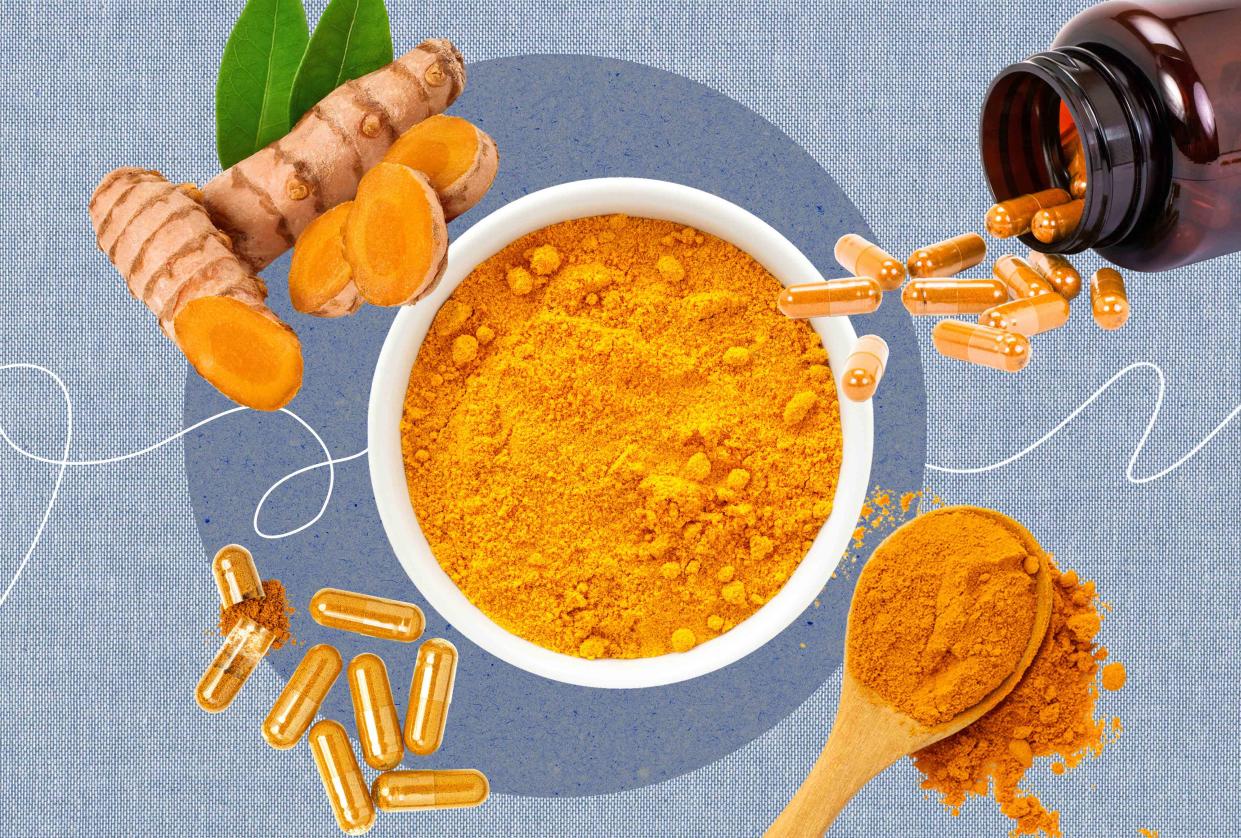Should You Take Turmeric Supplements?

Photo Illustration by Zack Angeline for Verywell Health; Getty Images
Turmeric has been used in culinary and medicinal practices for hundreds of years.
This spice is known for its antioxidant and anti-inflammatory properties.
Studies on turmeric are limited and offer mixed results but it is generally safe to add turmeric to your diet on a daily basis.
Turmeric is touted as a "cure-all" spice that can do everything from healing your gut, boosting memory, and reducing inflammation. But studies on the health benefits of this golden root have yielded mixed results.
A small study in 2017 found that curcumin—the active ingredient in turmeric—may improve memory and attention, while a larger randomized controlled trial in 2018 found that curcumin had no impact on reducing inflammation following aortic aneurysm repair surgery.
Zhaoping Li, MD, PhD, a professor of medicine at the University of California, Los Angeles, and co-author of the 2017 study, said curcumin "definitely has an anti-inflammatory effect." However, it's most effective when it's used for preventative purposes or to suppress low levels of inflammation associated with chronic disease.
If someone has a painful gout flare-up, for example, Li said turning to a curcumin supplement wouldn’t be the most effective treatment.
Although clinical trials on turmeric and curcumin are limited, existing research suggests that these may contain anti-inflammatory properties that could help manage osteoarthritis and support heart health.
How Much Turmeric Do You Need in Your Diet?
Many nutrition experts say that adding turmeric to your diet is relatively safe and likely won't lead to any negative side effects. However, some turmeric powders have been found to contain concerning traces of lead.
If you plan to add turmeric into your diet, Li said, you will see the most benefits by using it in place of a pro-inflammatory seasoning like salt. Cooking turmeric with olive oil, avocado, or another healthy fat may also increase curcumin absorption and enhance the anti-inflammatory effects.
While culinary doses of turmeric are generally considered safe, it's not easy to figure out how much to consume.
"Since the benefits of turmeric aren’t universally agreed upon in the scientific community, there are no established values for the recommended dietary allowance of turmeric," Matthew Black, MS, RDN, LD, a registered dietitian for The Ohio State University Wexner Medical Center, told Verywell in an email.
Related:6 Ways Turmeric Can Benefit Your Skin
Should You Take a Turmeric Supplement?
"Get what you need from foods first," said Sue-Ellen Anderson-Haynes, MS, RDN, LDN, a national spokesperson for the Academy of Nutrition and Dietetics based in the Boston area.
If you cook with turmeric and incorporate it into smoothies and teas several times a week, that should be enough, she added.
Supplements are an option for people who don't like turmeric or don't want to cook with it daily. However, experts say that turmeric supplements may contain much higher doses of curcumin than what people normally get from their regular diet, and this could increase the risk of side effects like heartburn or stomach pain.
Turmeric supplements may also interact with blood thinners, diabetes medications, and other drugs so experts recommend talking to a healthcare provider before taking a new supplement.
Most turmeric supplements are packaged in 500mg daily doses. If you decide to take a supplement, Black recommends looking for products that contain the highest amount of curcuminoids along with piperine, an extract of black pepper that can enhance curcumin absorption.
Turmeric supplements are generally safe, but there have been a few cases of reported toxicity. An ongoing study since 2006 found 10 cases of turmeric-related liver injuries out of 1,798 cases, and a few of those tested samples contained a combination of turmeric and piperine.
"Keep in mind, turmeric supplements are not regulated by the FDA, so potency does not have to be verified. You may be paying for a supplement with low amounts of curcuminoids," Black said. "Additionally, since label accuracy is not regulated, individuals using these supplements may be placing themselves at risk for potential harm when taking too much."
Read Next:Turmeric for Acne: Possible Benefits, Drawbacks, and Effectiveness
Turmeric may offer some anti-inflammatory benefits for people who incorporate this spice into their regular diet. While turmeric supplements are available, they're unregulated and their daily dosage might far exceed what you'd normally get from food. Speak with a healthcare provider before taking turmeric supplements because these may also interact with some medications you're taking.

